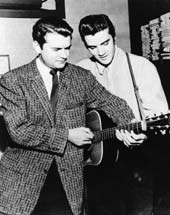|
ART WARS, 5:09
The Word in the Desert
For Harrison Ford in the desert.
(See previous entry.)
Words strain,
Crack and sometimes break,
under the burden,
Under the tension, slip, slide, perish,
Will not stay still. Shrieking voices
Scolding, mocking, or merely chattering,
Always assail them.
The Word in the desert
Is most attacked by voices of temptation,
The crying shadow in the funeral dance,
The loud lament of
the disconsolate chimera.
— T. S. Eliot, Four Quartets
The link to the word "devilish" in the last entry leads to one of my previous journal entries, "A Mass for Lucero," that deals with the devilishness of postmodern philosophy. To hammer this point home, here is an attack on college English departments that begins as follows:
"William Faulkner's Snopes trilogy, which recounts the generation-long rise of the drily loathsome Flem Snopes from clerk in a country store to bank president in Jefferson, Mississippi, teems with analogies to what has happened to English departments over the past thirty years."
For more, see
The Word in the Desert,
by Glenn C. Arbery.
See also the link on the word "contemptible," applied to Jacques Derrida, in my Logos and Logic page.
This leads to an National Review essay on Derrida,
The Philosopher as King,
by Mark Goldblatt.
A reader's comment on my previous entry suggests the film "Scotland, PA" as viewing related to the Derrida/Macbeth link there.
I prefer the following notice of a 7-11 death, that of a powerful art museum curator who would have been well cast as Lady Macbeth:
From the Whitney Museum site:
"Max Anderson: When artist Frank Stella first showed this painting at The Museum of Modern Art in 1959, people were baffled by its austerity. Stella responded, 'What you see is what you see. Painting to me is a brush in a bucket and you put it on a surface. There is no other reality for me than that.' He wanted to create work that was methodical, intellectual, and passionless. To some, it seemed to be nothing more than a repudiation of everything that had come before—a rational system devoid of pleasure and personality. But other viewers saw that the black paintings generated an aura of mystery and solemnity.
The title of this work, Die Fahne Hoch, literally means 'The banner raised.' It comes from the marching anthem of the Nazi youth organization. Stella pointed out that the proportions of this canvas are much the same as the large flags displayed by the Nazis.
But the content of the work makes no reference to anything outside of the painting itself. The pattern was deduced from the shape of the canvas—the width of the black bands is determined by the width of the stretcher bars. The white lines that separate the broad bands of black are created by the narrow areas of unpainted canvas. Stella's black paintings greatly influenced the development of Minimalism in the 1960s."
From Play It As It Lays:
She took his hand and held it. "Why are you here."
"Because you and I, we know something. Because we've been out there where nothing is. Because I wanted—you know why."
"Lie down here," she said after a while. "Just go to sleep."
When he lay down beside her the Seconal capsules rolled on the sheet. In the bar across the road somebody punched King of the Road on the jukebox again, and there was an argument outside, and the sound of a bottle breaking. Maria held onto BZ's hand.
"Listen to that," he said. "Try to think about having enough left to break a bottle over it."
"It would be very pretty," Maria said. "Go to sleep."
I smoke old stogies I have found...
Cigar Aficionado on artist Frank Stella:
" 'Frank actually makes the moment. He captures it and helps to define it.'
This was certainly true of Stella's 1958 New York debut. Fresh out of Princeton, he came to New York and rented a former jeweler's shop on Eldridge Street on the Lower East Side. He began using ordinary house paint to paint symmetrical black stripes on canvas. Called the Black Paintings, they are credited with paving the way for the minimal art movement of the 1960s. By the fall of 1959, Dorothy Miller of The Museum of Modern Art had chosen four of the austere pictures for inclusion in a show called Sixteen Americans."
For an even more austere picture, see
Geometry for Jews:

For more on art, Derrida, and devilishness, see Deborah Solomon's essay in the New York Times Magazine of Sunday, June 27, 1999:
How to Succeed in Art.
"Blame Derrida and
his fellow French theorists...."
See, too, my site
Art Wars: Geometry as Conceptual Art.
For those who prefer a more traditional meditation, I recommend
Ecce Lignum Crucis
("Behold the Wood of the Cross")
THE WORD IN THE DESERT
For more on the word "road" in the desert, see my "Dead Poet" entry of Epiphany 2003 (Tao means road) as well as the following scholarly bibliography of road-related cultural artifacts (a surprising number of which involve Harrison Ford):
A Bibliography of Road Materials
Posted 7/13/2003 at 5:09 PM | 






 in my previous entry. A check of
in my previous entry. A check of 











 leads an esoteric, special existence beyond the fringe of what is generally acknowledged to be the academic world."
leads an esoteric, special existence beyond the fringe of what is generally acknowledged to be the academic world."


































 aced with failure rates that could bar tens of thousands of students from graduating, the California State Board of Education voted yesterday to postpone the consequences of its high school exit exam for two years....
aced with failure rates that could bar tens of thousands of students from graduating, the California State Board of Education voted yesterday to postpone the consequences of its high school exit exam for two years.... 

















